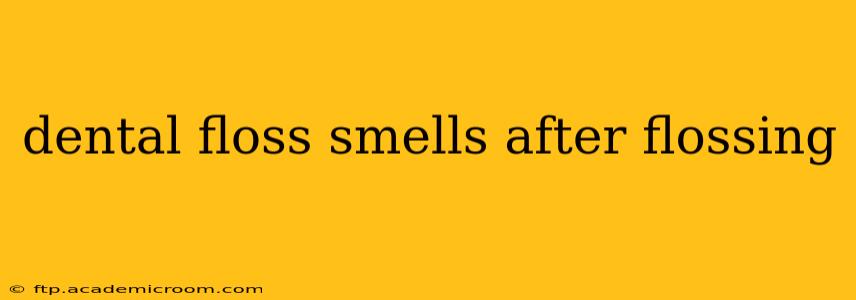Dental floss is a crucial tool in maintaining optimal oral hygiene, but sometimes, after flossing, you might notice an unpleasant odor. This isn't necessarily a sign of poor hygiene; it could stem from several factors. Understanding the reasons behind this smell can help you address the issue and maintain a healthy, fresh-smelling mouth.
What Causes Bad Breath After Flossing?
This is often the first question people ask. The smell after flossing isn't necessarily from the floss itself, but rather from the bacteria and food particles it dislodges. This debris, trapped between your teeth where your toothbrush can't reach, can produce volatile sulfur compounds (VSCs), the primary culprits behind bad breath. Flossing effectively removes this material, bringing it into contact with your saliva and potentially releasing those unpleasant smells.
Why Does My Floss Smell Bad After I've Used It?
The smell on the used floss comes directly from the bacteria and food particles you've removed. Think of it as a visual (and olfactory) representation of the success of your flossing efforts. The more buildup you have between your teeth, the stronger the smell will be.
How Can I Prevent My Floss From Smelling Bad?
The key to preventing smelly floss is proactive oral hygiene. Here’s how:
- Thorough Brushing: Brush your teeth twice daily for at least two minutes each time, using fluoride toothpaste. This helps remove surface-level bacteria and food particles before they become deeply embedded.
- Consistent Flossing: Floss at least once a day, preferably before brushing. This allows you to remove debris from between your teeth and along the gumline before brushing.
- Proper Flossing Technique: Use gentle, C-shaped motions to guide the floss between your teeth, avoiding snapping it against the gums. This prevents gum irritation and minimizes the potential for bleeding, which can exacerbate the smell.
- Mouthwash: Using an antimicrobial mouthwash can further reduce bacteria and leave your mouth feeling fresher.
- Regular Dental Checkups: Visit your dentist for regular checkups and cleanings. Professional cleaning removes plaque and tartar that you can't remove yourself, preventing the buildup of bacteria that leads to bad breath.
- Hydration: Drinking plenty of water throughout the day helps wash away food particles and bacteria.
- Dietary Considerations: Certain foods, such as onions and garlic, can contribute to bad breath. While flossing will help remove some of these odor-causing compounds, mindful eating can make a significant difference.
Is it Normal for Floss to Smell Bad After Use?
Yes, it's entirely normal for your floss to have a slightly unpleasant odor after use, especially if you haven't flossed regularly or have a significant amount of plaque buildup. However, a very strong or persistent foul odor could indicate an underlying oral health issue. This warrants a visit to your dentist.
What Should I Do If My Floss Smells Really Bad?
A consistently strong, unpleasant odor on your floss after flossing warrants a visit to your dentist. This could signal gum disease, cavities, or other dental problems requiring professional attention. Don't delay seeking professional help if you're concerned.
What if the smell is coming from the floss itself?
While it’s highly unlikely that the floss itself is the source of the smell, if you suspect this, try switching brands. Some individuals may have sensitivities or reactions to certain floss materials. Ensure you are using a reputable brand and that the floss packaging is undamaged.
This comprehensive guide provides insights into why your dental floss might smell after use and offers practical solutions to address the issue. Remember that a healthy mouth is a happy mouth, and consistent oral hygiene is key to maintaining both!
